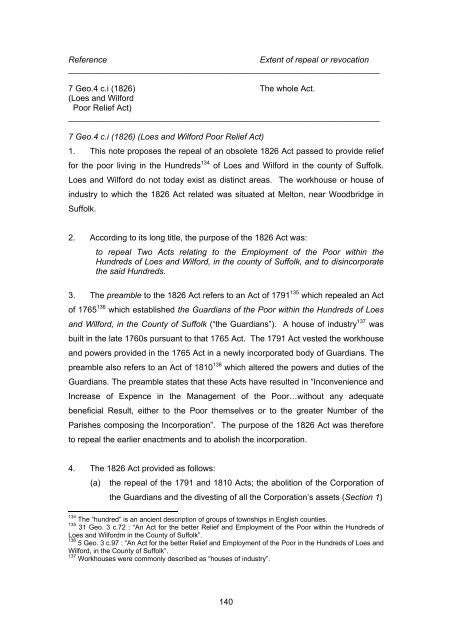Poor Relief - Law Commission
Poor Relief - Law Commission
Poor Relief - Law Commission
You also want an ePaper? Increase the reach of your titles
YUMPU automatically turns print PDFs into web optimized ePapers that Google loves.
Reference Extent of repeal or revocation<br />
___________________________________________________________________<br />
7 Geo.4 c.i (1826) The whole Act.<br />
(Loes and Wilford<br />
<strong>Poor</strong> <strong>Relief</strong> Act)<br />
___________________________________________________________________<br />
7 Geo.4 c.i (1826) (Loes and Wilford <strong>Poor</strong> <strong>Relief</strong> Act)<br />
1. This note proposes the repeal of an obsolete 1826 Act passed to provide relief<br />
for the poor living in the Hundreds 134 of Loes and Wilford in the county of Suffolk.<br />
Loes and Wilford do not today exist as distinct areas. The workhouse or house of<br />
industry to which the 1826 Act related was situated at Melton, near Woodbridge in<br />
Suffolk.<br />
2. According to its long title, the purpose of the 1826 Act was:<br />
to repeal Two Acts relating to the Employment of the <strong>Poor</strong> within the<br />
Hundreds of Loes and Wilford, in the county of Suffolk, and to disincorporate<br />
the said Hundreds.<br />
3. The preamble to the 1826 Act refers to an Act of 1791 135 which repealed an Act<br />
of 1765 136 which established the Guardians of the <strong>Poor</strong> within the Hundreds of Loes<br />
and Wilford, in the County of Suffolk (“the Guardians”). A house of industry 137 was<br />
built in the late 1760s pursuant to that 1765 Act. The 1791 Act vested the workhouse<br />
and powers provided in the 1765 Act in a newly incorporated body of Guardians. The<br />
preamble also refers to an Act of 1810 138 which altered the powers and duties of the<br />
Guardians. The preamble states that these Acts have resulted in “Inconvenience and<br />
Increase of Expence in the Management of the <strong>Poor</strong>…without any adequate<br />
beneficial Result, either to the <strong>Poor</strong> themselves or to the greater Number of the<br />
Parishes composing the Incorporation”. The purpose of the 1826 Act was therefore<br />
to repeal the earlier enactments and to abolish the incorporation.<br />
4. The 1826 Act provided as follows:<br />
(a) the repeal of the 1791 and 1810 Acts; the abolition of the Corporation of<br />
the Guardians and the divesting of all the Corporation’s assets (Section 1)<br />
134<br />
The “hundred” is an ancient description of groups of townships in English counties.<br />
135<br />
31 Geo. 3 c.72 : “An Act for the better <strong>Relief</strong> and Employment of the <strong>Poor</strong> within the Hundreds of<br />
Loes and Wilfordm in the County of Suffolk”.<br />
136<br />
5 Geo. 3 c.97 : “An Act for the better <strong>Relief</strong> and Employment of the <strong>Poor</strong> in the Hundreds of Loes and<br />
Wilford, in the County of Suffolk”.<br />
137<br />
Workhouses were commonly described as “houses of industry”.<br />
140
















